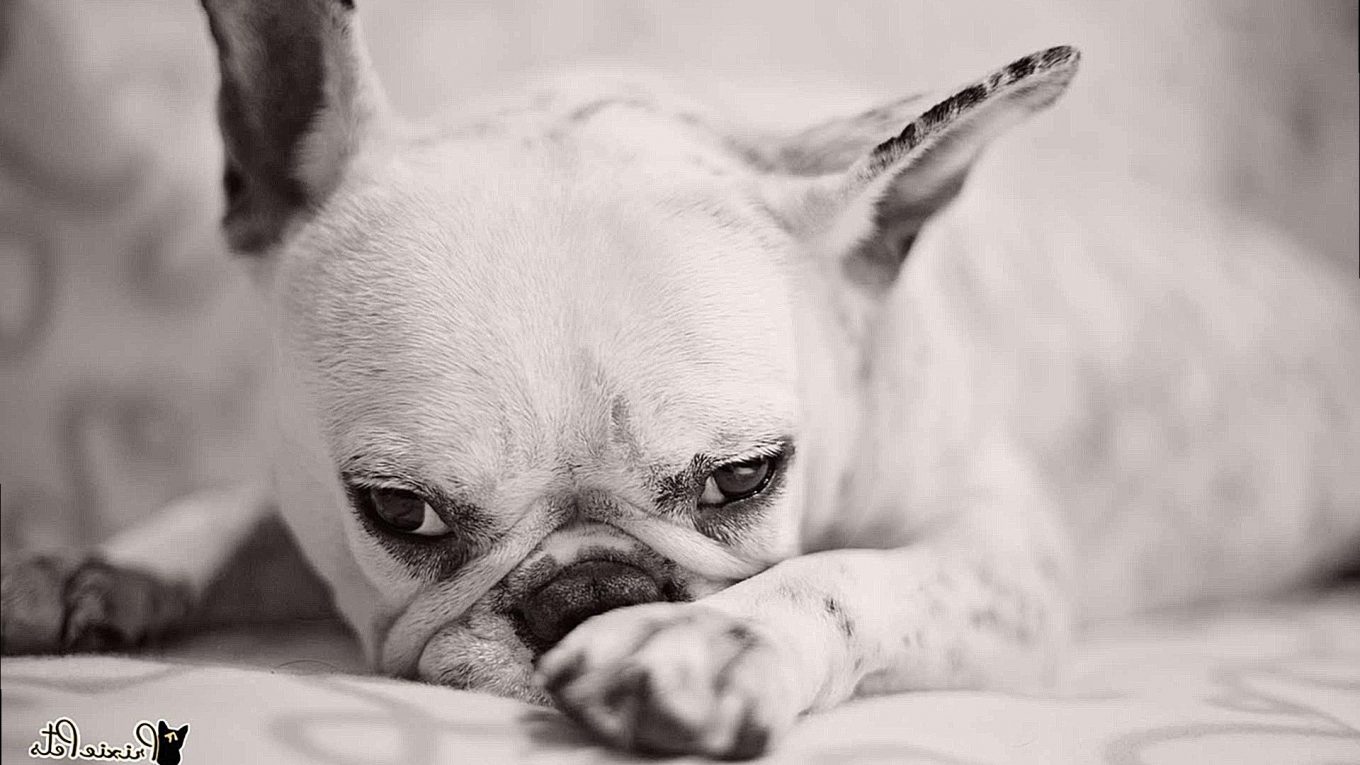How Do I Know if My French Bulldog is Depressed and Sad?
As a devoted French Bulldog owner, you’re likely to be familiar with your furry friend’s moods and behaviors. However, if you notice a persistent change in their behavior, it may be an indication that they’re experiencing depression or sadness. Dogs are capable of feeling a range of emotions, just like humans, including anxiety, stress, and depression.
It’s crucial to understand that depression and sadness in dogs should not be taken lightly. These emotions can have an impact on your dog’s overall well-being and lead to physical health issues. As a responsible pet owner, it’s essential to recognize the signs of depression and sadness in your French Bulldog so that you can take appropriate measures to help them.
In this blog post, we’ll discuss some telltale signs that your French Bulldog may be suffering from depression or sadness. We’ll also provide tips on how to differentiate these emotions from other common illnesses and offer advice on what you can do to support your four-legged friend. So if you want to ensure a happy and healthy life for your Frenchie, keep reading.
What Causes French Bulldog Depression?
Contents
Therefore, it’s crucial to understand the potential causes of French Bulldog depression.
One of the most common causes of French Bulldog depression is isolation or a lack of social interaction and stimulation. As social beings, French Bulldogs require regular interaction with their owners and other dogs to remain happy and healthy. If they spend too much time alone or in isolation, they may begin to exhibit signs of depression such as lethargy, decreased appetite, and a lack of interest in activities they once enjoyed.
Changes in routine or environment can also contribute to French Bulldog depression. Moving to a new home, changes in their diet or exercise routine, or the loss of a companion animal or human can all disrupt their sense of stability and routine, which can be stressful for them to cope with.
Health issues can also impact the mental health of your French Bulldog. Chronic pain or illness can cause them to feel lethargic, withdrawn, or irritable. It’s vital to keep an eye on your dog’s health and seek veterinary care if you notice any changes in their behavior or physical condition.
Lastly, genetics can play a role in French Bulldog depression. Some dogs may be predisposed to certain behavioral or emotional issues due to their genetic makeup. Although this cannot be easily controlled, it’s crucial for pet owners to be aware of any potential genetic factors that could contribute to their dog’s mental health.
If you suspect that your French Bulldog is suffering from depression, there are steps you can take to help them overcome it. Regular socialization and mental stimulation through playtime and exercise can help keep your furry friend happy and engaged.
By establishing a consistent routine and providing a safe, comfortable space for them to relax, you can create a sense of stability and security for your dog. And of course, offering comforting reassurance and affection can go a long way in helping your French Bulldog overcome their depression.

Common Signs of Depression in French Bulldogs
Just like humans, dogs can experience depression, and Frenchies are no exception. But how can you tell if your Frenchie is feeling low?
Depression
One of the most common signs of depression in French Bulldogs is a lack of interest in activities they once loved. If your Frenchie suddenly shows no enthusiasm for playing fetch or going for walks, it may be time to take notice. They may also become less active and spend more time sleeping or lounging around the house.
Changes in Their Appetite
Another sign to look out for is changes in their appetite. Your Frenchie may start eating less or more than usual or even stop eating altogether. Weight loss can further exacerbate their mental health issues.
Depressed French Bulldogs may also display changes in their behavior, such as becoming withdrawn or aloof, avoiding contact with people or other pets in the household.
Additionally, they may become more vocal than usual, barking or whining excessively.
In some cases, depression can manifest as physical symptoms such as hair loss or skin problems. This is because depression can weaken their immune system, making them more susceptible to infections and other health issues.
It’s essential to remember that not all dogs will exhibit the same signs of depression, and some may show no signs at all. If you suspect your French Bulldog is struggling with depression, it’s best to consult with your veterinarian for an accurate diagnosis and treatment plan.
Paying attention to your Frenchie’s behavior and mood is crucial in maintaining their mental health. By being aware of these common signs of depression, you can provide the proper care and support your furry friend needs to overcome this challenging condition.
How to Recognize the Signs of Depression in Your French Bulldog
French Bulldogs are beloved for their charming and loving personalities, but like all living beings, they can experience periods of sadness and depression. As a responsible owner, it’s essential to recognize the signs of depression in your furry friend and provide them with the necessary support and care.
Here are some ways to help you recognize the signs of depression in your French Bulldog:
Changes in Behavior
Your French Bulldog may show a lack of interest in activities they once enjoyed, such as playing or going for walks. If you notice that your Frenchie seems disinterested or unenthusiastic about engaging in their favorite activities, it may be a sign of depression. Pay attention to their behavior and habits.
Decrease in Appetite

A significant sign of depression in dogs is a decrease in appetite or loss of interest in food altogether. Keep an eye on your Frenchie’s water intake as well since dehydration can worsen their mood and overall health.
Behavioral Changes
Depression can cause your French Bulldog to become more withdrawn or lethargic, displaying a lack of energy or motivation. They may also start to exhibit signs of anxiety or fearfulness, such as trembling or cowering when approached.
Physical Symptoms
Depression can also manifest itself through physical symptoms, such as weight loss, a dull coat, or other symptoms of poor health. It’s important to take your dog to the vet if you notice any physical changes since it could indicate an underlying medical condition.
Changes in Sleeping Patterns
Keep an eye out for any changes in your French Bulldog’s sleeping patterns. If they seem to be sleeping more than usual or having trouble sleeping at all, it could be a sign that they are experiencing depression.
In conclusion, recognizing the signs of depression in your French Bulldog is crucial for their overall wellbeing. By being attentive to their behavior and habits, you can determine whether they are experiencing a period of sadness or require professional help from a veterinarian.
Tips to Help Your French Bulldog Overcome Depression
There are several tips you can follow to help your furry friend overcome their sadness and return to their happy-go-lucky selves.
Spend Quality Time Together
One of the best ways to lift your French Bulldog’s spirits is by spending more quality time together. Engage in activities that they enjoy, such as playing fetch or cuddling on the couch. This will not only help them feel loved and valued but also strengthen the bond between you and your pet. Dogs crave attention from their owners, and spending time with them can help reduce anxiety and stress levels.
Provide Plenty of Exercise and Mental Stimulation
A lack of exercise and mental stimulation can contribute to depression in dogs. Make sure your French Bulldog gets plenty of opportunities to run, play, and explore their environment.
Toys such as puzzle feeders and interactive toys can also provide mental stimulation and keep their minds engaged.
A tired dog is a happy dog, so make sure they get enough physical activity to release any pent-up energy.
Maintain a Consistent Routine
Dogs thrive on routine, so maintaining a consistent schedule can help them feel more secure and less anxious. This includes feeding, walking, and playtime schedules. Knowing what to expect each day can help reduce stress levels in your furry companion, making them feel more comfortable and at ease.
Consider Professional Help
If your French Bulldog’s depression persists despite your efforts, it may be time to seek professional help. A veterinarian or animal behaviorist can evaluate your dog’s behavior and provide guidance on how to address their depression. In some cases, medication or therapy may be necessary to help them overcome their emotional state.
Practice Patience and Understanding
Above all, it’s important to practice patience and understanding when helping your French Bulldog overcome depression. Remember that recovery takes time, and each dog is unique in their needs and responses.
Be patient with your pet, offer plenty of love and support, and celebrate small victories along the way. With consistent effort and understanding, you can help your furry friend overcome their emotional struggles.
When to Seek Professional Help for Your Dog’s Depression
If you notice your French Bulldog is showing signs of depression, such as loss of appetite, lethargy, excessive whining or barking, aggression, destructive behavior, withdrawal from social interaction, or changes in sleep patterns, it’s time to take action.
While providing your pup with love, care, and mental stimulation can be helpful in elevating their mood, sometimes more intensive interventions are necessary. In some cases, your dog’s depression may be so severe that it requires professional help.
If you’ve tried various methods to alleviate your dog’s depression but have not seen any improvement, it’s vital to consult with a veterinarian or an animal behaviorist. A veterinarian will first perform a physical exam to rule out any medical conditions that could be causing your dog’s depression.
Once medical conditions have been ruled out, a veterinarian may recommend medication or other forms of treatment for your dog’s depression.
An animal behaviorist can also be consulted to work with your furry friend on behavior modification techniques. They can help pinpoint the root cause of your dog’s depression and develop a plan to address it. This may include adjusting the dog’s environment, implementing positive reinforcement training, or other behavior modification techniques.
It’s crucial to seek professional help if your French Bulldog’s depression is impacting their quality of life and overall well-being. A professional can offer the necessary support and guidance to help your dog overcome their depression and improve their mental health.
Remember that every dog is unique, and there is no one-size-fits-all approach when it comes to treating depression in dogs. Be patient and understanding during this process and trust the professionals to tailor a plan that works best for your furry friend.
ao2xvC6UUaE” >
Conclusion
It’s essential to understand that just like humans, dogs can experience a range of emotions, including anxiety, stress, and depression. Therefore, recognizing the signs of depression and sadness in your furry friend is crucial to their overall well-being.
If you notice your French Bulldog experiencing lethargy, decreased appetite, a lack of interest in activities they once enjoyed, changes in behavior or physical symptoms such as hair loss or skin problems, it may be time to seek professional help. These signs persisting for an extended period can impact your dog’s quality of life.
Fortunately, there are several tips you can follow to help your furry friend overcome their sadness and return to their happy-go-lucky selves. Spending quality time together and providing plenty of exercise and mental stimulation can do wonders. Maintaining a consistent routine and practicing patience and understanding are also essential ways to support your Frenchie.
In conclusion, recognizing the signs of depression in your French Bulldog is crucial for their overall well-being.




